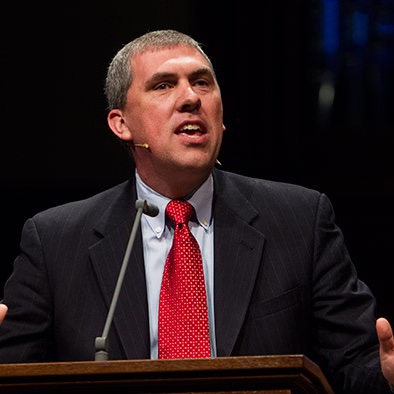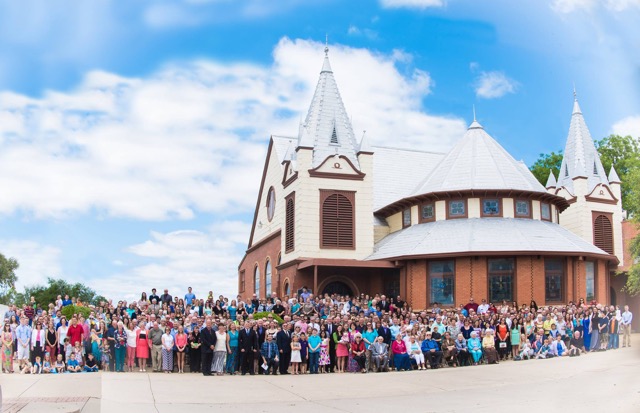
[SLIDESHOW=42353]FARMERSVILLE, Texas (BP) — Every day since devastating tornadoes touched down in rural communities northeast of Dallas this past December, First Baptist Church of Farmersville has been helping people recover.
Three or four times annually the last four years, the Texas church has ministered to an unreached people group in Senegal, West Africa. In January, members worked with an Iowa church in ministering to a nearby people group.
The outreaches appear to demonstrate First Baptist Farmersville’s commitment to both local and international ministry. Not only that, but the church embraced the “1 Percent Challenge” to increase its giving to the Cooperative Program, raising to 11 percent the 10 percent portion of undesignated gifts it had given to the program for 30 years.
 “God willing, we’ll do what we can to support the Great Commission through the Cooperative Program,” said Bart Barber, pastor of First Baptist Farmersville since 1999. “I keep telling people what we’re doing locally and globally is very important, but the most effective thing we do is funding through the Cooperative Program.”
“God willing, we’ll do what we can to support the Great Commission through the Cooperative Program,” said Bart Barber, pastor of First Baptist Farmersville since 1999. “I keep telling people what we’re doing locally and globally is very important, but the most effective thing we do is funding through the Cooperative Program.”
The Southern Baptist Convention Cooperative Program is the mechanism Southern Baptist churches use to cooperatively support local, state and international ministries.
“The most productive thing we do to preach the Gospel to all nations is to write a check each week to fund missions through CP,” Barber said. “The Cooperative Program is a conduit. It’s not a destination; it’s a pathway.”
Upwards of 300 people participate each week in Sunday worship at the Farmersville church. Children’s ministries include Awana, Trail Life USA, American Heritage Girls, 4-H and Upward Sports. Barber’s wife Tracy Barber heads the child care response unit for the Texas Baptist Men Disaster Relief ministry and also is involved at the national level.
The church hosts the town food pantry and served as a shelter and county response center after the December tornados.
“We’re regularly reaching out to help people, such as building ramps and porches,” the pastor said. “We are the church in town, when people need help paying a bill, they come to us.”
The church partners with the Southern Baptists of Texas Convention in ministry in the Rio Grande Valley and with a Montana church in the planting of Crossroads Baptist Church in Four Corners, Mont. In 1996, First Baptist Farmersville started Iglesia Bautista Immanuel in Farmersville and is making plans to partner with a 2017 church plant in Montreal, Canada, for West Africans.
“We were involved in Cuba, in helping a London (England) church over a rough patch, and we’ve also been to Mexico several times,” Barber said. “Southern Cross Ministries took us to Thailand and Hong Kong.”
Helping people in the church’s hometown of about 3,500 has helped grow the church.
“We don’t have a college or university here, so people moving in tend to be families, and as a congregation we minister to people through family faith ministries,” Barber said. Through such activities as Upward Basketball and mountain climbing trips, the church shares the Gospel.
“Also, we respond at difficult times and that has been helpful,” he said. “We’ve seen some fruit” from post-tornado ministry.
Participation in ministry helps deflect the increasing secularism seen “even in the Bible Belt,” he said. “We see even some children who grow up in church who hear the call of atheism and soft secularism. I think also we face the challenge of radically shifting morality in our country, even into the church.”
Barber, who was called to preach at 11 and has pastored since his junior year in high school, attends annual national and state Southern Baptist meetings, taking his wife and their two homeschooled children.
The 11 percent, $80,000, the church gives to the Cooperative Program, Barber said, is indicative of his interest in the SBC.
“I wouldn’t hire an $80,000-a-year employee and not supervise him, not take an interest in what he is doing,” he said. “Besides, going to the annual meetings is the way our church has a voice in the Cooperative Program activities of our convention.”
It was at an SBC annual meeting in 2011 that Barber heard Tom Elliff, then president of the International Mission Board, challenge churches to adopt an unreached, unengaged people group. Barber took the challenge back to his membership, and went to every age group, even preschoolers, to ask them to pray about the outreach.
“I see all the more the beauty of the Cooperative Program because of what we’re doing in Senegal,” Barber said. “We know this people group exists because of CP. IMB-funded missionaries made the first contact and connected us with them.
“The primary thing we do there is evangelistic work,” he said. “We walk up to somebody’s house and see if they’re interested in talking. We tell them a couple stories out of the Bible and if they’re open to that, tell them the Gospel.”
War-torn for 30 years, Senegal is not an easy place to minister, Barber said. Highly venomous snakes are among the wildlife. In the Casamance region of southern Senegal, landmines remain prevalent, and there is danger of encountering a “hot zone” of flying bullets. Islam is the dominant religion, although the 2010 Pew Research study, “Tolerance and Tension: Islam and Christianity in Sub-Saharan Africa,” found that 58 percent of the general population of Senegal embraces the traditional religious practice of ancestral worship, common to animism.
“[Animism is] a very oppressive religion that builds fear and guilt into the people who adhere to it, and most of them know there’s no future in it,” Barber said. “When we tell about the power Jesus has over evil spirits, that generates a lot of interest in people hearing about the Gospel.”
To date, 28 people in Senegal have made professions of faith in Jesus through First Baptist Farmersville’s evangelism, Barber said.
“We talk about Senegal at least monthly, mostly in the context of reporting back or requesting prayer for a trip we’re about to take,” Barber said. “We ask people to go to an active war zone and live without air conditioning or running water, and walk in the sun and in the jungle in Africa eight hours a day. And every time we go, people ask by name about everyone who has gone before. They want to see you again.”
















